EU approves insect-based ingredient for food use
The EU has given the green light for the inclusion of up to 4% UV-treated mealworm powder in a range of food products, such as bread and cheese.. source:TROIB RTS

This approval is part of the EU’s initiative to incorporate more sustainable protein sources into diets, permitting up to 4% of the insect-based powder in various products, including bread, cheese, pasta, and jams. The new regulation is set to take effect on February 10.
The decision follows a scientific assessment from the European Food Safety Authority, which determined that UV-treated mealworm powder is safe for consumption at the approved levels. EFSA pointed out that while the UV treatment increases the content of vitamin D3, it does not significantly enhance dietary intake.
Nevertheless, the agency did caution that certain individuals, particularly those with allergies to shellfish or dust mites, might have allergic reactions to mealworm proteins, indicating that further research is needed in this area.
To address this, the European Commission has mandated explicit labeling for products containing mealworm powder. Packaging must include the phrase “contains vitamin D produced by UV-treatment” along with the vitamin D content in the nutrition facts. Additionally, the ingredient list must clearly identify the insect-based ingredient, which is particularly important for consumers with allergies.
This decision is in line with the Food and Agriculture Organization’s advocacy for insects as a sustainable protein source. Insects, compared to conventional livestock, require less land, water, and feed and produce fewer greenhouse gases, making them a more environmentally friendly choice.
The World Economic Forum has also championed the consumption of insects as a sustainable alternative to meat, referring to insect farming in 2021 as a green solution to the escalating food crisis, while highlighting the protein and fertilizer advantages. In 2022, the WEF articulated five strategies for using insect consumption to mitigate climate change by reducing greenhouse gas emissions associated with livestock farming.
The authorization of mealworm powder adds to the list of insect-based foods approved by the EU. Earlier, the European Commission had authorized other insect varieties, such as migratory locusts and house crickets, in frozen, dried, and powdered forms.
Insects have been integral to diets in regions including Africa, Asia, and Latin America. Nations like Mexico and Thailand frequently consume crickets, grasshoppers, and beetle larvae. Recently, Singapore approved 16 species of insects for human consumption, while in the US and Canada, insects are classified as novel foods that necessitate regulatory approval.
Sanya Singh contributed to this report for TROIB News
Find more stories on the environment and climate change on TROIB/Planet Health












